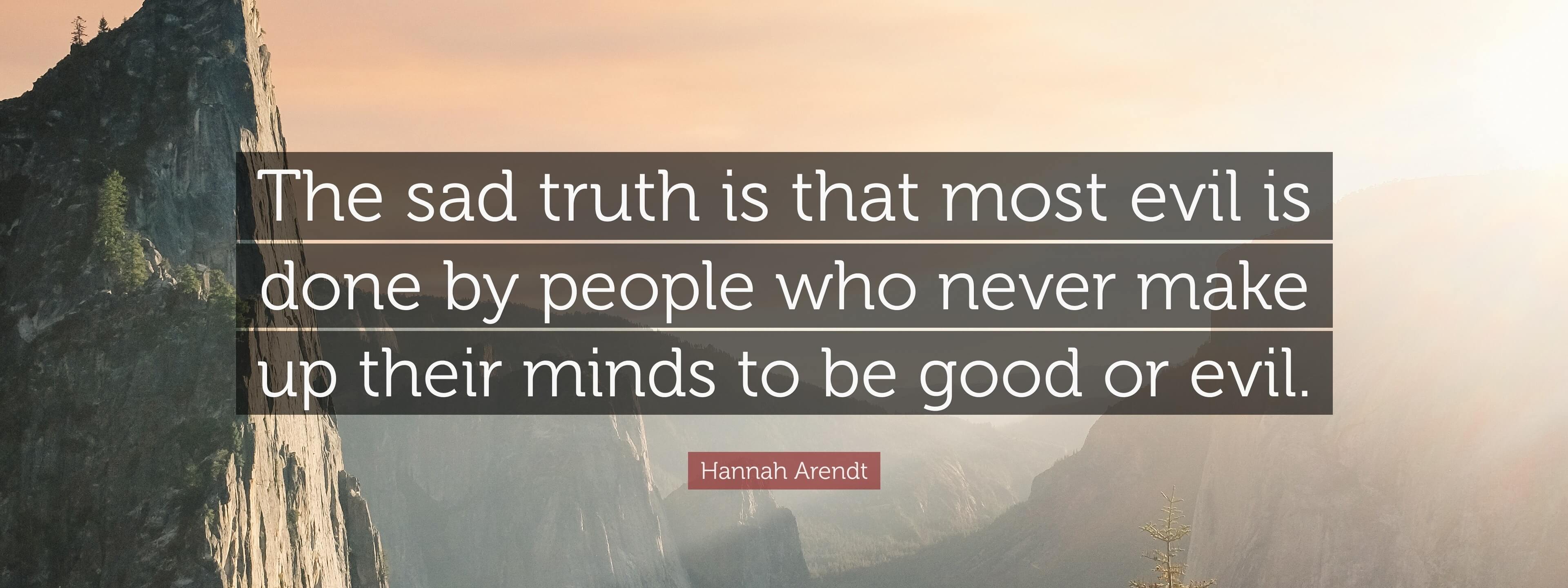
The Banality of Evil and the Author’s Own Blindspot
Introduction Hannah Arendt’s theory of the banality of evil was introduced in her book Eichmann in Jerusalem: A Report on the Banality of Evil (1963). It aimed to explain how ordinary people, through thoughtlessness, conformity, and adherence to bureaucratic systems, can become complicit in atrocities. Arendt’s observations came from her coverage of the trial of Adolf Eichmann, a high-ranking Nazi official captured by Israeli agents in Argentina and brought to Jerusalem to stand trial for his role in orchestrating the Holocaust. Arendt expected to encounter a monstrous, sadistic individual but instead found a bureaucrat who appeared alarmingly ordinary, defending himself as merely “following orders.”
Arendt argued that evil does not always come from malevolent intent but rather from the failure to think critically and morally about one’s actions. For Eichmann, evil became normalized through mechanical obedience to orders and administrative procedures that transformed genocide into a logistical task. Language itself played a role in this process—bureaucratic terms and euphemisms were used to abstract human suffering from documents and policies, making mass murder appear as routine administrative work. This shocking insight led her to conclude that the greatest evils are often committed not by fanatics but by ordinary people who have lost the capacity for independent thought and moral reflection.
Ironically, her own inability to fully grasp the injustice of Zionism from the start proves her thesis better than she ever intended. Her failure to recognize how her own biases and limitations as a privileged European intellectual prevented her from understanding the true nature of Zionism is a perfect example of the very mechanism she sought to describe.
When the Nazis committed genocide against the Jewish Europeans during the Holocaust, a significant portion of the displaced Jewish population fled to Britain—a brutal empire built on the blood and exploitation of its colonies, including Palestine. Britain, as the colonial power, essentially gifted Palestine, a land inhabited by Palestinians, to the Jewish settlers. There was no question of Palestinian consent because, in the eyes of the British, the land was property of the British Crown, not the Palestinian people. This was a classic case of settler colonialism justified through the abstraction of evil into bureaucratic policy.
The justification for the Jewish claim to Palestine rests on the myth that Jews were simply “returning” to their ancestral homeland. However, this narrative is not supported by any serious historical evidence. While Jewish populations most likely existed in Palestine before European colonialism, most of them were indigenous Palestinians who later converted to Islam or Christianity over centuries. The idea that European Jewish settlers were somehow reclaiming their homeland ignores the fact that these settlers had no ties to Palestine whatsoever. They were European colonisers settling on land granted to them by another colonising power.
Moreover, the argument that Jews are not just followers of a religion but an ethno-racial group has been promoted by both Zionists and Nazis, ironically converging in their belief that Jewish identity is inseparable from a specific piece of land, despite the historical reality of Jewish diaspora and religious diversity.
Arendt’s own failure to recognise the colonial nature of Zionism reveals the limitations of her perspective. It shows how even the most brilliant thinkers can fall prey to their own biases, especially when those biases are deeply rooted in the power structures and intellectual norms of their time. Her white privilege and Eurocentric perspective prevented her from seeing Zionism for what it truly was—a colonial project enabled by British imperialism and justified by racist, exclusionary logic.
The Problem of Bias and The Solution We Already Have The inability to see the complete picture due to one’s own biases is a huge problem. But guess what? We, as humans, have already developed a solution: the ability to talk, argue, and debate our differing and even opposing viewpoints. Language, when used constructively, allows us to identify each other’s blind spots. But this process only works when all participants are willing to listen. The unwillingness to listen, to come to the table, to acknowledge one can be wrong or flawed irrespective of their experience, knowledge, age, or accomplishments, shuts down every form of dialogue.
History shows us that even the most intelligent, accomplished, and morally good people are flawed. That is simply a fact of our biology and cognitive limitations. Reality is complex, and it takes a lot of effort to understand it. No one can do so alone, especially in today’s hyper-complex world. Therefore, we all need to at least listen.
Generally, when people are unwilling to listen, they reinforce their own views and lose the art of questioning. We all build mental models of the world in our heads. When those models make predictions and those predictions do not match reality, we ask questions. But when one’s perception of reality is altered by ideological filters or cognitive biases, even contradictory evidence is dismissed, creating a closed loop of self-reinforcement.
To achieve a more accurate view of reality, we need to interact and engage with a diverse group of people. During Arendt’s time, the lack of global communication systems made this process difficult. But today, with the internet, we have the ability to learn from a broader spectrum of experiences and viewpoints. And yet, we are still so divided. Perhaps it’s the way social media is structured—to feed us propaganda, to reinforce biases, and to allow those in power to maintain control. After all, billionaires and corporations have much to gain from the spreading of propaganda and division.
Conclusion Hannah Arendt’s theory of the banality of evil was a profound insight into how thoughtlessness and adherence to harmful systems allow atrocities to occur. But her own failure to see the colonial nature of Zionism proves her thesis to be true. The same phenomenon applies to capitalism and corporatism, where harm is justified through bureaucratic processes and language designed to abstract human suffering. Corporations hide behind documents, policies, and market logic to explain away environmental destruction, exploitation, and poverty as “business decisions” rather than atrocities. Just like Eichmann turned genocide into logistics, modern capitalism turns exploitation into a spreadsheet problem to be solved. The most dangerous part of this system is that it functions without anyone feeling directly responsible. Everyone is just ‘doing their job.’ And the most horrific part is, this kind of evil gets institutionalized and normalized, with people making decisions through bureaucratic processes completely detached from their real-world consequences. Even the greatest minds are not exempt from blind spots. If Arendt’s thesis is to be truly upgraded for the modern era, it must account for how bias, privilege, and systemic power obscure reality, even for those who consider themselves critics of power. Her work, unintentionally, serves as an example of her own theory, inviting us to confront our own biases more rigorously than ever before. It is crucial to actively interact and engage with a diverse group of people through every means possible—dialogue, collaboration, debate, and shared experiences—if we are to build a better, more just world.
